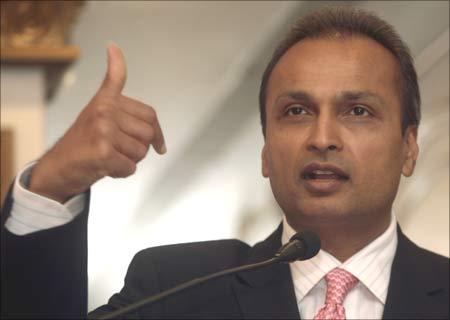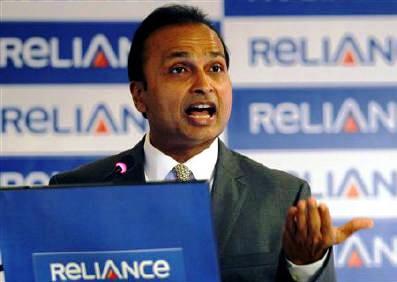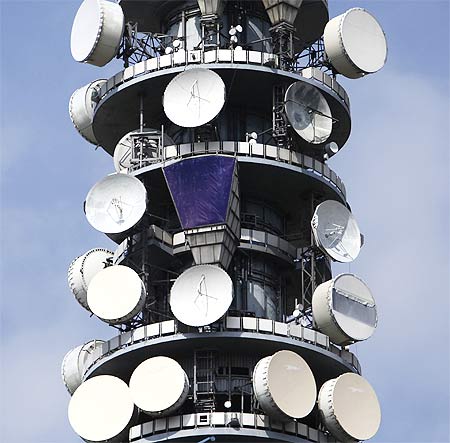Photographs: Reuters BS Reporter in New Delhi
Reliance Communications Chairman Anil Ambani has complained to the Prime Minister that the Empowered Group of Ministers on telecom had taken a 'biased' decision on the one-time fee structure.
He says it favours the "older coterie of GSM operators led by Bharti Airtel".
In his letter dated October 11, written before the last EGoM meeting, Ambani has said the government would incur a loss of at least Rs 35,000 crore (Rs 350 billion) if the EGoM had decided to charge for excess spectrum beyond 6.2 MHz only prospectively from 2012, and not from 2008.
. . .
India is biased against new telecom players: Anil
Image: This file photo shows Anil Ambani speaking during a news conference in Mumbai.Photographs: Danish Siddiqui/Reuters
According to Ambani, "When I look at the completely biased and partisan approach adopted by the Department of Telecom against new players like Reliance and Tatas, to the staggering financial advantage of the older coterie of GSM operators led by Bharti Airtel, I am left wondering whether all this can be attributed just to poor judgment or there is something more than meets the eye".
The department of telecom, Ambani wrote, "is vehemently recommending retrospective amendment of our contracts, to make us pay for spectrum beyond 4.4 MHz/2.5MHz for the balance almost 50 per cent term of our licences.
. . .
India is biased against new telecom players: Anil
"On the other hand, the DoT sees great virtue in allowing the coterie of older GSM operators led by Bharti Airtel to have enjoyed the benefits of spectrum up to 6.2 MHz for 90 per cent of the term of their licences".
After his letter, the EGoM had, on October 18, decided to tweak the structure of the one-time fee under which operators must pay prospectively for spectrum beyond 4.4 MHz in GSM and 2.5 MHz in CDMA. It also clarified that the retrospective charge would apply from July 2008 to December 2012.
. . .
India is biased against new telecom players: Anil
Photographs: Jessica Rinaldi/Reuters
The Attorney General of India had suggested the one-time fee be imposed on incumbent operators -- beyond 6.2 MHz for GSM and beyond 5 MHz for CDMA players -- retrospectively from July 2008, when the government took the decision to impose such a fee.
In his second opinion, the AG had said the key point was whether the contracted spectrum given to the operators was 4.4 MHz or 6.2 MHz for GSM, and 2.5 Mhz or 5 MHz for CDMA operators.
Just because no allotment was made between 4.4 MHz and 6.2 MHz to some operators doesn't mean, he said, that 4.4 MHz becomes the contracted spectrum.
. . .
India is biased against new telecom players: Anil
Photographs: Reuters
Ambani, in his letter, has said the EGoM's decision was "highly unusual", noting "the views of the Deputy Chairman of the Planning Commission who had endorsed the approach of the learned AG have also been brushed aside".
"International lenders, rating agencies and investors were aghast at the new EGoM decisions, which once again destroy the sanctity of past contracts and threaten the fabric of a stable investment environment," Ambani said in his letter.
The RCom chief had further said the global community was also "concerned" that the EGoM decisions would lead to "fresh protracted litigation and widespread adverse international coverage".







article